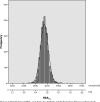D
Deleted member 596235
Guest
I really appreciate everybody's comments here—particularly
as I'm a T2 newbie—as the field of dietary protocols and even
the medical experts' opinions seem like a minefield of varied
information and even misinformation.
Food carbohydrates are to me particularly confusing, with many
medicos saying that as long as one is eating an overall "healthy"
diet containing all the necessary daily requirements of vitamins,
proteins, minerals and fibre etc, then the carbohydrates will
effectively take care of themselves.
Then I've seen several people saying that carbohydrates are the
enemy of anyone's healthy diet—presumably including some
high-carbohydrate foods such as oats, which are described as
"an incredibly healthy whole grain and a great source of many
vitamins, minerals, and antioxidants", while being 70% carbohydrate.
(As do quinoa and buckwheat).
This prompts me to ask a simple question: does a diabetic person
maintaining a specific and successful low carbohydrate diet eat
oats, quinoa, or buckwheat? Or avoid them because of their high
carbohydrate content?
And are carbohydrates inherently the "enemy" of—in my case of
T2—a healthy diet?
as I'm a T2 newbie—as the field of dietary protocols and even
the medical experts' opinions seem like a minefield of varied
information and even misinformation.
Food carbohydrates are to me particularly confusing, with many
medicos saying that as long as one is eating an overall "healthy"
diet containing all the necessary daily requirements of vitamins,
proteins, minerals and fibre etc, then the carbohydrates will
effectively take care of themselves.
Then I've seen several people saying that carbohydrates are the
enemy of anyone's healthy diet—presumably including some
high-carbohydrate foods such as oats, which are described as
"an incredibly healthy whole grain and a great source of many
vitamins, minerals, and antioxidants", while being 70% carbohydrate.
(As do quinoa and buckwheat).
This prompts me to ask a simple question: does a diabetic person
maintaining a specific and successful low carbohydrate diet eat
oats, quinoa, or buckwheat? Or avoid them because of their high
carbohydrate content?
And are carbohydrates inherently the "enemy" of—in my case of
T2—a healthy diet?
Last edited by a moderator:

